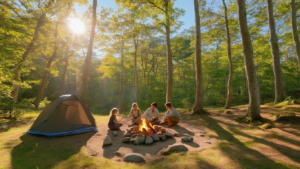What are the traditions of preppers – Unveiling the Survivalist Lifestyle
Diving into the world of preppers, one is met with a unique blend of tradition and innovation. This community, known for its commitment to self-reliance and preparedness, has a rich array of customs that define its identity.
From stockpiling food and water to mastering survival skills, the traditions of preppers are deeply rooted in a desire for independence and security. These traditions are not simply about surviving potential disasters, but cultivating resilience and adaptability in everyday life.
Stay tuned as we delve deeper into the fascinating customs of preppers, exploring the practices, beliefs, and values that set this community apart. Whether you are a seasoned prepper or just curious about this lifestyle, this exploration promises to be an enlightening journey into the world of self-sufficiency and survival.

What are prepper traditions?
Preppers, also known as survivalists, are individuals who actively prepare for emergencies, including possible disruptions in social or political order. Their traditions are deeply rooted in self-reliance and preparedness. One of the most common traditions is stockpiling supplies, which includes food, water, medical supplies, and other essentials. This is done to ensure survival during prolonged periods of crisis.
Another tradition is the acquisition of survival skills, such as hunting, fishing, and foraging. These skills are often passed down through generations and are considered a rite of passage in many prepper communities.
Preppers also have a tradition of developing emergency plans. These plans outline the steps to be taken in various disaster scenarios, including natural disasters, economic collapse, and civil unrest. They often include evacuation routes, communication plans, and strategies for obtaining resources.
A less known tradition is the practice of barter and trade. Preppers often stockpile items not only for their use but also for trading in post-disaster scenarios. Items commonly used for barter include ammunition, alcohol, and precious metals.
Lastly, preppers have a tradition of community. Despite the individualistic nature of prepping, many preppers form communities, both online and offline, to share knowledge, resources, and support. These communities are often tight-knit and operate on principles of mutual aid and cooperation.
How do preppers store food?
Preppers, individuals who prioritize emergency preparedness, have a number of methods for storing food. One of the most popular is canning, a process that involves preserving food in airtight containers. This method allows for the long-term storage of a wide variety of foods, including fruits, vegetables, and meats.
Another common method is dehydration. By removing the moisture from food, preppers can significantly extend its shelf life. Dehydrated foods are lightweight, making them an excellent choice for bug-out bags or mobile survival kits.
Preppers also often resort to freezing as a food preservation method. While this requires a consistent power source, it can keep food safe for long periods.
- Long-term storage solutions
In addition to these methods, preppers also invest in long-term storage solutions. These include purchasing commercially prepared freeze-dried or dehydrated meals, which can last for up to 25 years when stored properly.
Proper storage conditions are also a key consideration for preppers. Most foods should be kept in a cool, dark, and dry place to extend their shelf life.
Lastly, preppers often practice rotation of their food supplies. This means consuming stored food and replacing it with new supplies, ensuring that nothing goes to waste and that their stockpile remains fresh. This practice, known as stock rotation, is an essential part of the prepper tradition.
Why do preppers stockpile ammunition?
Preppers, individuals who prioritize self-sufficiency and readiness for potential disasters, often stockpile ammunition as part of their preparation strategy. One of the main reasons is for self-defense. In a scenario where societal order breaks down, the ability to defend oneself and one’s family becomes crucial. Having a sufficient supply of ammunition ensures that preppers are equipped to protect their resources and loved ones.
Another reason preppers stockpile ammunition is for hunting. In a post-disaster world, traditional food sources may not be readily available, making hunting a viable alternative. Ammunition, in this case, becomes a critical resource for survival.
Bartering is another factor. In a disrupted economy, ammunition could serve as a valuable commodity for trade, much like gold or silver. It’s a tangible asset that maintains its value, regardless of economic conditions.
Lastly, preppers often accumulate ammunition as a form of investment. The price of ammunition tends to rise over time, and purchasing in bulk can be a cost-effective strategy.
• Self-defense
• Hunting
• Bartering
• Investment
These are the primary reasons why preppers stockpile ammunition. It’s a tradition rooted in the philosophy of preparedness, self-reliance, and survival. Each prepper’s approach may vary, but the common thread is the desire to be ready for whatever the future may hold.
What survival skills do preppers learn?
Preppers, also known as survivalists, equip themselves with a plethora of skills to tackle potential disasters and emergencies. A significant part of prepper tradition involves learning and mastering survival skills. One of the most critical skills is Wilderness Survival, which includes knowledge on finding water, building shelter, and identifying edible plants and insects.
Another essential skill preppers often learn is First Aid and Medical Training. They familiarize themselves with basic first aid procedures, handling medical emergencies, and even performing minor surgeries.
Food Preservation is another integral skill in the prepper tradition. They learn to can, dehydrate, and smoke food, ensuring their sustenance in times of crisis.
Moreover, preppers also learn Fire Making. This skill is not only crucial for cooking and warmth but also for signaling during emergencies.
– Self-Defense is another crucial skill. Preppers often train in martial arts, firearms, and other defense mechanisms to protect themselves and their communities.
Lastly, Navigation Skills are vital for preppers. They learn to use traditional navigation tools like maps and compasses and natural signs to find their way in unfamiliar territories.
In essence, the traditions of preppers are rooted in self-sufficiency and survival, with a focus on learning skills that ensure their safety and survival in any situation.
What is a prepper bug out bag?
A prepper bug out bag is a portable kit containing all the items one would need to survive for 72 hours when evacuating from a disaster. It’s a vital part of the prepper tradition, which emphasizes self-reliance and preparedness for various potential catastrophes.
This bag typically includes essentials like food, water, a first-aid kit, tools, and emergency supplies. It’s designed to be lightweight and easy to carry, enabling quick mobility during an evacuation. Preppers meticulously pack their bug out bags, often customizing them to their specific needs and the types of disasters they anticipate.
Preppers also often include:
- Navigation tools such as maps and compasses
- Shelter items like a tent or a sleeping bag
- Fire-starting equipment
Survivalism is a lifestyle that advocates self-sufficiency and preparedness in various aspects, including food storage, self-defense, and even growing your own food. The bug out bag is a perfect example of this tradition, embodying the prepper’s readiness to face and overcome any disaster.
Remember, the goal is not just to survive, but to maintain a certain level of comfort and safety during a disaster. As such, each item is carefully chosen for its utility and necessity. The tradition of preppers is not just about fear of disasters, but about the empowerment that comes from being prepared.
How do preppers plan for emergencies?
Preppers, individuals who prioritize emergency preparedness, adopt a variety of traditions and methods to ensure their survival during crises. One of the most fundamental aspects of prepper traditions is stockpiling. They accumulate essential items such as food, water, medical supplies, and other necessities. This is done to ensure self-sufficiency in the event of a disaster when these resources may become scarce or unavailable.
Another key tradition among preppers is the development of survival skills. This includes learning how to hunt, fish, forage, and preserve food. They also acquire skills in first aid, navigation, and self-defense. These skills are vital for survival when society’s normal functioning is disrupted.
Preppers also prioritize physical fitness and mental toughness. They understand the importance of being in good health and having a strong mindset to survive challenging situations. They often engage in regular exercise and mental training to build resilience.
Moreover, preppers are known for their detailed emergency planning. They create comprehensive plans for various disaster scenarios, detailing steps for evacuation, shelter, communication, and more.
- Stockpiling essential items
- Developing survival skills
- Prioritizing physical and mental fitness
- Detailed emergency planning
These traditions reflect the prepper’s commitment to self-reliance and their readiness to face potential disasters. By following these traditions, preppers aim to ensure their survival and that of their loved ones during emergencies. Their approach is rooted in a deep understanding of the fragility of societal structures and the unpredictability of life, leading them to prepare for the worst while hoping for the best.
Why do preppers choose off-grid living?
Preppers, individuals who actively prepare for emergencies, often choose off-grid living as a part of their tradition. This lifestyle choice stems from their desire for self-sufficiency, a key tenet of prepping culture. Living off the grid allows preppers to be independent of public utilities, thereby reducing their reliance on external systems that can fail during a crisis.
An essential aspect of off-grid living involves producing one’s own food and water. Preppers often cultivate their own gardens, raise livestock, and use rainwater harvesting systems. This not only ensures a steady supply of necessities but also allows them to control the quality of their resources.
Off-grid living also offers a sense of security. In a world where data breaches and privacy invasions are increasingly common, living off the grid provides a way to protect personal information. By disconnecting from public utilities and services, preppers can safeguard their privacy and avoid potential threats.
Survival skills are another important aspect of off-grid living. Preppers often learn skills such as hunting, fishing, and foraging, which can be vital in a survival situation. These skills not only provide a means of sustenance but also offer a sense of empowerment and self-reliance.
• Lastly, off-grid living aligns with the prepper’s value of sustainability. By using renewable energy sources and practicing sustainable farming, preppers can reduce their environmental impact and contribute to a healthier planet.
In essence, off-grid living embodies the core principles of prepping: self-sufficiency, security, survival skills, and sustainability. It’s a lifestyle choice that empowers preppers to be resilient and prepared for any situation.
What kind of gear do preppers prioritize?
Preppers, individuals dedicated to self-reliance in the face of potential disasters, prioritize certain gear to ensure their survival. A fundamental part of their tradition is the acquisition and maintenance of essential survival items. Water purification systems are high on the list, as access to clean water is a critical survival need.
Preppers also prioritize food storage solutions. They opt for non-perishable, nutrient-dense foods that can be stored for long periods. These include canned goods, freeze-dried meals, and bulk grains.
Another significant gear category is first aid supplies. Preppers often have extensive kits, including bandages, antiseptics, and essential medicines.
Shelter solutions such as tents, tarps, and sleeping bags are also important. Preppers prepare for the possibility of having to leave their homes and needing temporary shelter.
Additionally, preppers focus on communication devices. Radios, particularly those that can operate on multiple frequencies, are essential for staying connected in a crisis.
- Fire-starting tools
- Multi-tools
- Flashlights
These items are also common in a prepper’s kit, providing essential functionality in a variety of survival scenarios.
Lastly, preppers prioritize self-defense tools. These can range from firearms to non-lethal options like pepper spray.
The tradition of prepping involves a comprehensive approach to survival, with gear selection reflecting a holistic view of potential challenges.
Conclusion: Understanding the Traditions of Preppers
In conclusion, the traditions of preppers are as diverse as they are fascinating. From food storage techniques to stockpiling ammunition, these practices are rooted in the desire for self-sufficiency and preparedness. The survival skills they acquire are not just limited to physical abilities but also encompass mental resilience and strategic planning. A prepper’s bug out bag is a symbol of their readiness to face any emergency, containing essential gear prioritized according to their personal survival strategy.
Living off-grid is another common tradition among preppers, a lifestyle choice that reflects their independence and adaptability. The importance of emergency planning in prepper traditions cannot be overstated, emphasizing their proactive approach to potential threats.
For those interested in adopting some of these traditions, start by identifying your priorities, learn the necessary survival skills, and gradually build your bug out bag. Keep an eye on emerging trends in the prepper community, such as advancements in survival gear or changes in emergency response protocols.
Remember, the essence of being a prepper is not just about surviving, but thriving in any situation. So, whether you’re a seasoned prepper or a beginner, continue to learn, adapt, and prepare for the future.




